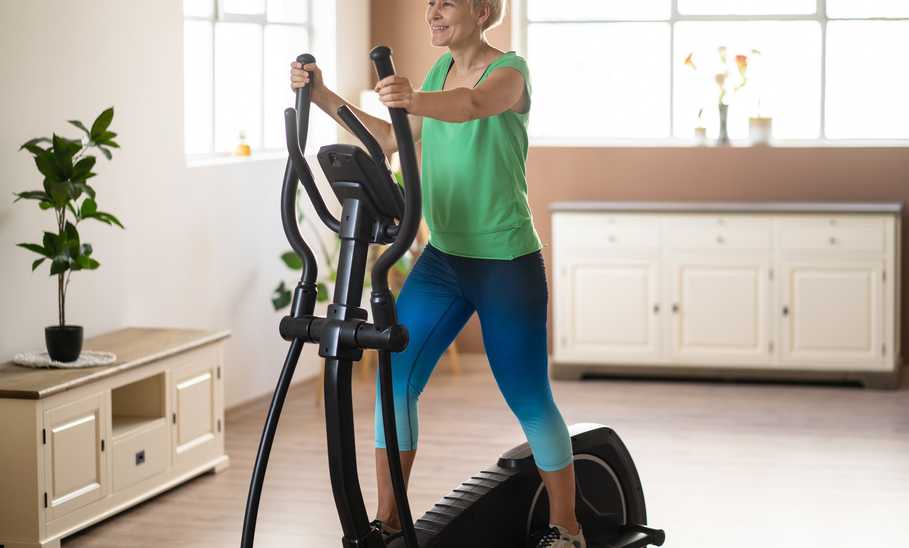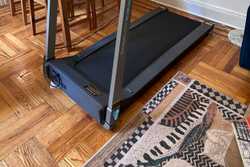Elliptical Benefits: What Does the Elliptical Do? Discover the Benefits and How to Make the Most of Your Workout

Our evaluations and opinions are not influenced by our advertising relationships, but we may earn a commission from our partners’ links. This content is created by TIME Stamped, under TIME’s direction and produced in accordance with TIME’s editorial guidelines and overseen by TIME’s editorial staff. Learn more about it.
It’s not uncommon for people to discount the elliptical machine as the easier option when it comes to choosing a form of cardio. But look a little closer and you’ll see a different story.The elliptical offers a total body workout while also providing a low-impact option for those looking to increase their heart rate and get their sweat on. Read on as I take a deep dive into this classic cardio machine.
There are numerous benefits to making the elliptical a regular part of your workout regimen.
In other words, ellipticals are perfect for beginners and seasoned exercisers alike. “The elliptical is a highly accessible machine because the physical action required looks very easy to do, and is not too dissimilar than simply walking,” explains Samantha Clayton, a certified health coach, fitness trainer, and former Olympic sprinter. It doesn’t require any training and you don’t have to worry about not using the proper form (like you do with other forms of cardio). “The handrails provide a sense of security to those new to exercise and the fact that it has a dual action of working arms and legs at the same time gives people the confidence that they can accomplish a lot of work on one machine,” Clayton adds.
“The elliptical is a perfect machine for anyone wishing to have low-impact movement on the joints due to discomfort or preference,” says Clayton. Folks recovering from knee or ankle injuries, people with arthritis in the knees, hips, or ankles, postpartum people, or anyone else who can’t handle jumping or other high-impact movements like running will be perfectly comfortable on the elliptical.
“The elliptical machine is a full-body piece of equipment that effectively works all major muscle groups and promotes improved cardiovascular fitness (working your most important muscle of all — the heart),” cheers Clayton. It can be a one-stop shop for your fitness needs.
Sometimes you don’t want to push your muscles to their limits but you do want to move your body. On those days, the elliptical is perfect. “Some days you may just want to be gentle on the joints and the mind,” Clayton says. “It’s a great machine for when you’re feeling a bit tired or stressed. The machine is supportive for your balance with the handles and allows for you to zone out a little unlike the Stairmaster or treadmill, where you need to be fully mentally alert so you don’t fall off.”
For as simple as the elliptical feels when you’re on it, there is actually quite a bit going on. The movement your body goes through on the elliptical is like a cross between running, climbing, and cross-country skiing. With your feet on the pedals and your hands on the handles, you push with your feet and push and pull with your hands to turn the flywheel in the front of the machine. Most elliptical machines have different resistance levels, so you can make it more difficult to turn the flywheel, while others allow you to manipulate the incline to work your muscles in different ways.
As you move on the elliptical, you’re working almost every muscle in your body. That starts with the legs. “The quadriceps are engaged when you push down on the pedals, and hamstrings are working when you pull the pedals back toward the midline of the body,” explains Clayton. “The glutes are your drivers that are activated in both the push and pull action and the calves get some work each time you push and lift the heel.”
Then there’s the upper body, which gets the benefit of going through both a push and a pull. “Your back, primarily the latissimus dorsi, trapezius, and rhomboids, are working as you pull the handles toward you, and the shoulders, biceps, and triceps are all working each time you push and pull the handles toward you,” Clayton says. Finally, there’s the core. “The core muscles, rectus abdominis, and obliques, all activate to help maintain balance throughout the movement,” Clayton adds.
Even though the elliptical is often positioned as an easier option than running, you can get many of the same fitness perks. “The cardiovascular benefits are very similar, especially if you compensate for the reduced impact nature of the machine by turning up the dial on the resistance to keep your output and heart rate up,” Clayton says. “The time spent exercising and the intensity at which you exercise will determine your overall caloric burn, and an elliptical workout can be structured to be just as tough as a run.”
That said, there are two main differences. First, running has a much higher impact on your bones and joints, which can yield improvements in bone density, explains Clayton. The primary muscles that are being challenged are also slightly different. “Your core and lower body are more challenged with a run,” she adds. “But you get more of an arm and back workout with the elliptical.”
Just like with running, the elliptical and cycling share some similarities and differences. “Both offer a low-impact cardiovascular workout,” says Clayton. “The elliptical targets a wide range of muscles, while cycling primarily targets lower body muscles and engages the core for stability.”
There’s also the fact that you can’t do the elliptical outside. “Cycling may offer additional outdoor benefits and social opportunities,” notes Clayton. Running offers these additional perks as well.
How does the elliptical stack up to other popular forms of cardio? Find out here.
“The elliptical can potentially provide a more intense workout compared to walking, with the possibility for higher calorie burn and greater cardiovascular benefits,” says Clayton. “The variable resistance and action of the arms and legs makes it a more intense option.” Both are quite low-impact and gentle on the joints, while walking provides the bone-strengthening benefit of also being a weight-bearing activity. “Walking is accessible to nearly everyone, requiring minimal equipment and offering the flexibility to be incorporated into daily routines,” Clayton adds.
Rowing machines have become increasingly popular in recent years, and while both the elliptical and the rower offer full-body workouts and similar cardio results, the primarily muscles working are different. “While the elliptical primarily targets muscles in the legs, arms, chest, and back, the rowing machine focuses on muscles in the legs, arms, back, and core,” Clayton says. “There is extra glute recruitment from rowing because it involves a powerful pushing motion with the legs against resistance.”
You’ll often find a Stairmaster or two alongside the elliptical machines at the gym, but how do they compare? “While the Stairmaster offers a vigorous workout for the lower body, it typically doesn't engage the upper body muscles to the same extent as an elliptical machine,” Clayton says. “The cardiovascular benefits and calorie burn can be similar, but the Stairmaster’s added resistance of climbing maybe gives it the edge.”
There are a few ways you can use the elliptical as part of a varied fitness regimen. For cardio, Clayton recommends a 30 to 45 minute session two days a week. You can also use it to warm up or cool down on days when you focus on strength training. “My motto is mix it up and listen to your body,” says Clayton. “Most of all, do what feels good and fun because repetition is what ultimately leads to optimal health benefits.”
“The main drawback is that it does not translate into making you better at a specific life skill,” Clayton explains. “Walking the stairs, running, cycling, and walking all translate into practice for real-life motions.” If you’ve heard the term “functional fitness,” the elliptical would not fall into this category, as it doesn’t involve movements that you are doing daily.
What’s more, if you’re considering purchasing an elliptical to use at home, you’ll need to ensure your ceiling is high enough to accommodate the machine. It’s also worth noting that you can’t fold or stand the elliptical on end for storage, like you can with treadmills or rowers.
Belly fat loss is not achieved by simply doing hundreds of crunches — you need to force your body to tap into its fat stores for energy. “Elliptical training, particularly when performed at moderate to high intensity and supplemented with intervals, enhances calorie expenditure, thereby supporting fat loss,” says Clayton. It’s important to note that exercise, regardless of the form you prefer, is only one piece of the fat loss puzzle. The food you eat is the other. Favoring fruits and vegetables and avoiding processed carbs and sugar will also promote belly fat loss.
That depends entirely on you. If you’re using the elliptical in a lackadaisical way, not engaging your upper body or increasing your speed or resistance, you’re missing out on the potential toning benefits. But if you’re working hard and taking advantage of every minute you spend on the machine, you’re going to see and feel the results much sooner.
Yes! The elliptical machine offers a total body workout, engages virtually every muscle group while also improving your cardiovascular fitness.
The information presented here is created by TIME Stamped and overseen by TIME editorial staff. To learn more, see our About Us page.



